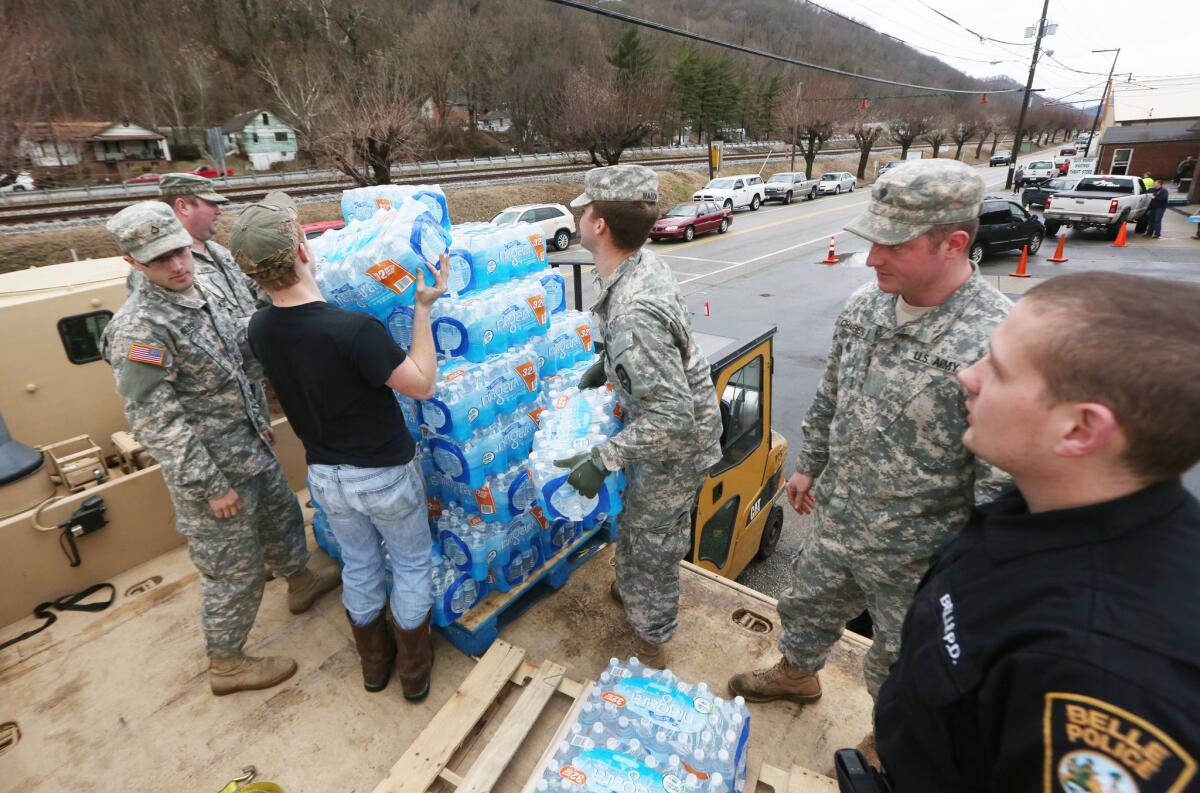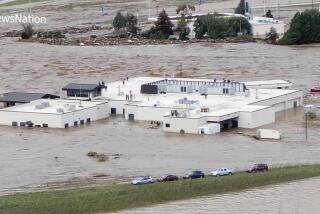West Virginians to be without water for days because of chemical spill

CHARLESTON, W.Va. — For the third straight day, with more ahead, about 300,000 residents of West Virginia were unable to use their tap water because a chemical solvent leaked into the area’s water supply Thursday.
As authorities on Saturday worked to flush pipes that supply water to Charleston and nine counties in the state, officials said it will take several days to properly test the water to ensure it is safe to drink.
“I would think we’re talking days,’’ West Virginia American Water Company president Jeff McIntyre told reporters Saturday afternoon. The timeline will vary depending on location and customer demand on the state’s largest water utility.
An emergency order against using the tainted water has all but shut down Charleston, the state capital, where schools, restaurants and businesses were told to close late Thursday. Downtown Charleston remained dark and shuttered Saturday.
McIntyre said the order will not be lifted until tests confirm levels lower than one part per million of the chemical foaming agent 4-methylcyclohexane methanol. That is the level set by federal environmental and health standards for safe human consumption.
Thousands of residents lined up in a driving rain Saturday morning to collect bottled water or to fill containers with drinking water supplied by emergency management agencies. The West Virginia Army National Guard had delivered 1.4 million liters of water by Saturday, Guard commanders said, with another 1.6-million liters on the way.
State and federal agencies continued to investigate how the chemical, used in processing coal, spilled out of a containment tank Thursday morning into the Elk River about a mile upstream from the water company’s treatment facility.
Exposure to 4-methylcyclohexane methanol can cause nausea, dizziness, vomiting and eye and skin irritation, authorities said. The emergency order issued by Gov. Earl Ray Tomblin advises residents not to use tap water for drinking, bathing, brushing teeth or washing dishes or clothes. Not even boiling the water will make it safe, authorities said.
At least 73 people reported to emergency departments complaining of skin irritation, nausea or vomiting, but only a handful were admitted to hospitals, said Karen Bowling of the state Department of Health and Human Resources.
“We’ve had a lot of worried-well calls,’’ said Dr. Rahul Gupta of the Kanawha-Charleston Health Department. He said calls from people complaining of ailments linked to the water have dropped sharply since Friday.
A state regulatory agency ordered the chemical company responsible for the spill, Freedom Industries, to remove all remaining chemicals from its plant site. The company president, Gary Southern, apologized for the spill, calling it “unfortunate and unanticipated.”
Southern said the chemical was stored in a 35,000-gallon tank. He said the company could not determine how much had escaped from the tank and a surrounding containment area.
The company is “following all steps necessary to fix the issue,” Southern said. The entire system must be flushed to eliminate the chemical, which one official described as “highly soluble.”
Authorities estimated Friday that about 2,000 to 5,000 gallons leaked into the Elk River. But on Saturday, Mike Dorsey, chief of emergency response for the state Department of Environmental Protection, said subsequent calculations put the estimate at about 7,500 gallons.
Dorsey said state officials believe the chemical tank is no longer leaking. Waterways downstream, including the Kanawha and Ohio rivers, will not be affected because the solvent will have been diluted, he said.
Because testing and sampling requires time and sophisticated equipment, the water company and state environmental officials said it was too early Saturday to determine the level of water contamination.
“We don’t know that the water is not safe, but I can’t say it is safe,” McIntyre said Friday. He did not change that assessment when questioned by reporters Saturday.
State authorities said a soaking rain that swept over Charleston and surrounding counties early Saturday morning could help dilute the chemical.
The state DEP said Freedom Industries had violated water and air standards by allowing the spill. The chemical emits a faint licorice-like odor, which wafted over Charleston on Friday night.
The environmental agency disputed Freedom Industries’ contention that the company took steps to stop the leak as soon as it was discovered Thursday morning. The agency said the company had done nothing to contain the spill when inspectors arrived around 11 a.m. Thursday in response to complaints from residents of a noxious odor.
U.S. Atty. Booth Goodwin said federal authorities opened an investigation into the cause of the spill, which affected residents of Charleston, in Kanawha County, and in the counties of Boone, Cabell, Clay, Jackson, Lincoln, Logan, Putnam and Roane.
With a dense fog rising over the Kanawha River in Charleston, traffic jams formed Saturday morning as residents waited in line for water distributed by the Guard. Many complained about a third day without a shower and put the blame squarely on Freedom Industries.
“It’s killing me, not being able to shower,” Sammy Robinson said as he waited for bottled water at the Malden Volunteer Fire Department just outside Charleston. “People are really upset with that chemical company. They better fix this fast.”
Chuck Fulks, 59, a construction company employee, waited in his pickup truck to fill large plastic containers with water from a tank brought by the Guard.
“They didn’t maintain their product like they should have, and it’s affected a lot of people’s lives,” Fulks said in the parking lot at an automobile stamping plant in western Charleston. “It looks like they didn’t follow regulations.”
Jason Martin, 30, said he was working out at a gym Thursday afternoon when he heard about the emergency water order. He has not been able to properly wash up since, he said.
“I can’t believe they let so much of that chemical to get into the water,” Martin said. “It’s not what you’d expect from a company like that.”
Several lawsuits were filed Friday against Freedom Industries, most by businesses forced to shut down under the emergency order, city officials said. The company received at least one anonymous telephone threat, according to the county sheriff.
Though many residents criticized the chemical company and complained of discomfort, others pitched in to help distribute water and other emergency supplies.
W.L. “Squeak’’ Peterson, chief of the Malden fire department, said local companies donated forklifts and other moving equipment so that firefighters would not have to unload heavy pallets of bottled water by hand. He said many residents pitched in to help distribute water — one case per car — and direct traffic that jammed roads around distribution centers.
Doug Poston, 52, lives across the street from the Malden fire station. After he received his water, he said, he stuck around and helped direct traffic. He said he was supposed to start a new job as a waiter Saturday morning, but the restaurant had shut down because of the emergency.
When the first water shipment arrived at 10 p.m. Friday, Peterson said, a long line of cars had already been waiting for hours. Distribution was supposed to resume at 8 a.m. Saturday, but Peterson decided to start at 7 a.m. because so many people were waiting in the heavy rain.
Peterson said he still hasn’t acclimated to using bottled rather than tap water for ordinary daily tasks. When he took his morning medicine Saturday, he gulped down a class of water from the kitchen tap even though a plastic container of clean water was at his feet.
“Force of habit,’’ he said.
ALSO:
Crippling West Virginia chemical spill leaves Charleston dry, quiet
Day 3 of West Virginia chemical spill and tap water is still a danger
Feds sending clean water to West Virginia in wake of chemical spill
More to Read
Sign up for Essential California
The most important California stories and recommendations in your inbox every morning.
You may occasionally receive promotional content from the Los Angeles Times.











